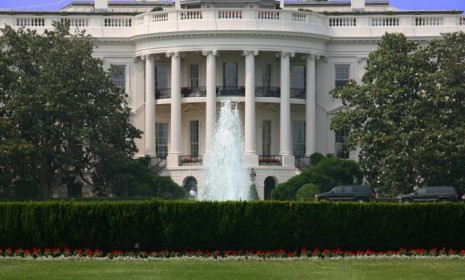Will the economy rebound no matter who wins the presidency?
The central question of the campaign has been which candidate would return the nation to prosperity. But is our immediate economic future out of their hands?

A free daily email with the biggest news stories of the day – and the best features from TheWeek.com
You are now subscribed
Your newsletter sign-up was successful
Distracting gaffes aside, the economy has been at the heart of the 2012 presidential campaign, and when voters go to the polls on Tuesday, many will pull the lever for the candidate they believe is better equipped to lead the recovery and put Americans back to work. "Mitt Romney says Barack Obama's policies will consign the U.S. to an extended period of sluggish economic growth, at best," say Rich Miller and Steve Matthews at Bloomberg. "The president says his Republican challenger's plans will sow the seeds of another mammoth recession. Both are wrong."
No matter who wins the election tomorrow, the economy is on course to enjoy faster growth in the next four years as the headwinds that have held it back turn into tailwinds. Consumers are spending more and saving less after reducing household debt to the lowest since 2003. Home prices are rebounding after falling more than 30 percent from their 2006 highs. And banks are increasing lending after boosting equity capital by more than $300 billion since 2009.
"The die is cast for a much stronger recovery," said Mark Zandi, chief economist in West Chester, Pennsylvania, for Moody’s Analytics Inc. He sees growth this year and next at about 2 percent before doubling to around 4 percent in both 2014 and 2015 as consumption, construction and hiring all pick up.
The Week
Escape your echo chamber. Get the facts behind the news, plus analysis from multiple perspectives.

Sign up for The Week's Free Newsletters
From our morning news briefing to a weekly Good News Newsletter, get the best of The Week delivered directly to your inbox.
From our morning news briefing to a weekly Good News Newsletter, get the best of The Week delivered directly to your inbox.
But such growth isn't automatic, says Michael Sivy at TIME. The president-elect will have to act fast or it won't happen. Tuesday's winner may not face the nightmarish economy Obama inherited, but he "will scarcely have time to catch his breath once the ballot counting is completed" before he's confronted with "a host of terribly difficult economic issues."
In the absence of a more comprehensive agreement to reduce the deficit, last year's deal to raise the debt ceiling required automatic spending cuts — almost $55 billion in defense cuts that would take effect in 2013, as well as $38 billion in non-defense cuts. This so-called fiscal cliff, which is already having a depressive effect on the economy, includes spending reductions of at least seven percent for a wide range of federal activities, from health and education to the immigration service and the court system. No one really wants this to happen, but preventing it will require a compromise on deficit reduction that hasn’t been reached after more than a year.
If the next administration doesn't change course, we're in trouble, says Glenn Hubbard at Politico. The recovery is fragile, recent jobs reports reflect dark clouds ahead, and businesses are struggling against strong "headwinds from uncertainty over tax policy, health care reform, and regulation." America's prosperity is slipping, and the trend will continue unless we reverse the policies of the last four years, which have failed to get businesses investing and hiring again.
An alternative economic program focused on long-term challenges and opportunities in tax and budget, trade, energy, and regulation can raise both growth and employment. In a white paper published this summer, Kevin Hassett, Greg Mankiw, John Taylor, and I estimated that the Romney economic program would increase both near-term and long-term growth and make possible the creation of 12 million jobs by 2016.
A free daily email with the biggest news stories of the day – and the best features from TheWeek.com
Or we can wait, month by month, for the next employment report.
Read more political coverage at The Week's 2012 Election Center.
-
 The broken water companies failing England and Wales
The broken water companies failing England and WalesExplainer With rising bills, deteriorating river health and a lack of investment, regulators face an uphill battle to stabilise the industry
-
 A thrilling foodie city in northern Japan
A thrilling foodie city in northern JapanThe Week Recommends The food scene here is ‘unspoilt’ and ‘fun’
-
 Are AI bots conspiring against us?
Are AI bots conspiring against us?Talking Point Moltbook, the AI social network where humans are banned, may be the tip of the iceberg